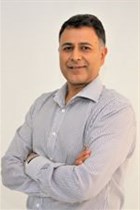Traditional media models are broken and new business thinking is required going forward, urges Omar Essack, group deputy CEO of Kagiso Media.
"We are looking at our business very differently. There will be real shifts in our business model and our business thinking for this year. The game changer within our company is the appointment of a chief innovation officer (Vincent Maher). Everything else has been evolutionary and incremental."
The outdated traditional media model consists of weighty head offices, permanent staff, provident funds, and so on, Essack explains. Content creation going forward will be more creative and require vast talent pools, not narrow talent pools.
The traditional media model has excess installed capacity to support the organisation, when things are moving towards a shared economy. Here Essack references services such as Uber and Airbnb.
"People will produce and share content all the time. A lot of it is bullsh*t, but there is a lot of amazing stuff as well. To change our environment, we need to find out what our customers are doing, and what they are willing to do."
Essack became the youngest managing director of a private radio station in South Africa in 1998 at 32. He devised and led the strategy to make East Coast Radio the first station in South Africa with a multi-ethnic audience mix. After a successful stint at East Coast Radio, he was promoted to head up the group's broadcast media assets in 2004. He developed the group's digital media focus, and in 2013, spearheaded the launch of Kagiso Media's first wholly owned free-to-air TV channel, Glow TV. He was promoted to deputy group CEO after a 10-year stint as CEO of Broadcasting.
"The current trend is that we have excess installed capacity in business. That is what companies like Uber respond to and what the sharing economy is all about. That is creating the disruption. The excess installed capacity as regards Uber, is the fact that I live and work in the same city, yet own a car. It is wastage, inefficiency. Cloud responds to the fact we have these huge servers installed. We buy this capacity as business, but we are not using it in an efficient way.
"We create all these huge buildings to house workers - but many of us are knowledge workers and there is so much tech to allow us to communicate. We could work from home more. The 'sharing economy' is a progression of these trends. We need to create efficiencies in the world today - there is too much installed capacity. All of that creates the problems we have in our environment: a lot more wastage, a lot more pollution. The whole efficiency of resources, it is born out of the recession we find ourselves in."
Business disruption
Essack, who recently completed an advanced management programme in media and entertainment at the IESE Business School, with UCLA Anderson, says he can see the sharing economy gaining greater momentum. He is already reconsidering whether he needs a second car in his family, since he lives and works in the same suburb.
It is all about creating efficiency without more waste and technology is the enabler in the developed economies, where there are apps for everything and responsive technology makes it possible for people to connect for shared dinner in places like New York where restaurants are expensive; to share their homes through services like Airbnb, which only started a couple of years ago, but is becoming a global phenomenon; like Uber, teething problems aside, recounts Essack.
This disruptive trend has an impact on business in most sectors and Essack says he is looking at how his business can respond to this trend and other innovations.
"The most obvious way, and all media businesses are doing this, is that it's all in the cloud - on-demand video, music, and so on. Previously we had capacity issues, now we do not need to keep anything on site any longer. The cloud is the best way to deliver. You don't need a PVR. Now people are streaming music into their cars - it happened to me in a car in Spain where broadband is cheap and fast. Radio has to respond to that.
"Our problem in South Africa is still high broadband costs, but when we overcome that, many of our devices will become obsolete. This generation doesn't want to horde. How will business respond to that?"
The shifts are inexorable, says Essack. Cars, which were a bastion for radio companies are under pressure, the cloud is there for everything now, including music, which will render some devices obsolete. "Radio was responsive, we did a lot of things that worked in the past decade. We have to now work out what's next...
"DStv, Xbox, Sony Playstation all want to 'own' the home. The large screens in our environment in the future - as walls or wallpaper - will deliver TV, internet, calls, gaming, news, music, everything. There will be nothing that can't link into the one screen. It will be all about personalisation, recommendation, access. We need to be ready."
For more:







































